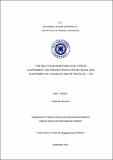Please use this identifier to cite or link to this item:
http://hdl.handle.net/11547/5375| Title: | THE RELATIONSHIP BETWEEN THE TURKISH GOVERNMENT AND HUMANITARIAN INTERNATIONAL NON-GOVERNMENTAL ORGANIZATIONS BETWEEN 2011 – 2019 |
| Authors: | Al Ghussein, Fidaa |
| Keywords: | Turkish Government Humanitarian INGOs Refugees Security Cooperation paradigms Syrian Crisis2011 Türk Hükümeti Yabancı İnsani Yardım Kuruluşları Suriye savaşı 2011 Mülteciler Türk Vatan Güvenliği 2016 askeri darbe girişimleri başarısız oldu |
| Issue Date: | Sep-2019 |
| Publisher: | ISTANBUL AYDIN UNIVERSITY INSTITUTE OF SOCIAL SCIENCES |
| Abstract: | The relationship between the Turkish government and HINGOs has been and still full of tensions, misperceptions, lack of trust and many other gaps that started with the beginning of the Syrian refugee’s influx to the country following the conflict in Syria back in 2011.Until today the relationship status between both actors still missing the cooperative basis in which the relationship dynamics should rely on in this context. this research aims at understanding the relationship dynamics between the Turkish government and international foreign humanitarian aid providers who started to operate in the Turkish territories with the beginning of the Syrian crisis, bringing in a completely new concept to the Turkish context, which is the HINGOs sector or in other words the foreign humanitarian aid actors. This vague mysterious relationship was not tackled by scholar’s due to the sensitivity of its obvious circumstances, the Turkish government’s suspicious perception of HINGOs and the operational challenges faced by HINGOs because of the governments restrictions and lack of experience in dealing with the humanitarian sector. The research is qualitative based in terms of methodology, where set of unstructured interviews were conducted with high level government representatives related directly to the researched subject, and with HINGOs representatives who liaise directly with Turkish government’s different institutes for operational, and policy discussions purposes. The interviews aimed at understanding the mutual misperception, relational gap, after the failed military coup of 2016’s policy confusions, challenges and cooperation opportunities. The main findings emphasize that the Turkish government acknowledge the fact that they lacked and still lack experience in dealing with the humanitarian crisis. There is no systematic approach or specialized department that efficiently organizes the relationship between both actors until today, this is the main reason behind the huge relational gaps facing HINGOs and the Turkish Government in working cooperatively. The main recommendations in this research includes a suggested paradigm of cooperation that will contribute to enhancing the relationship dynamics, bridge the gaps and support the humanitarian space. Hence increase Turkey’s ranking amongst the countries piloting humanitarian work in later stages. |
| URI: | http://hdl.handle.net/11547/5375 |
| Appears in Collections: | Tezler -- Thesis |
Files in This Item:
| File | Description | Size | Format | |
|---|---|---|---|---|
| 10295411.pdf | 2.24 MB | Adobe PDF |  View/Open |
Items in DSpace are protected by copyright, with all rights reserved, unless otherwise indicated.
